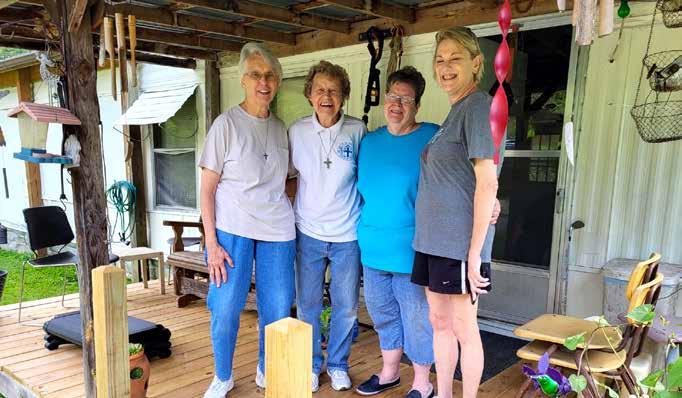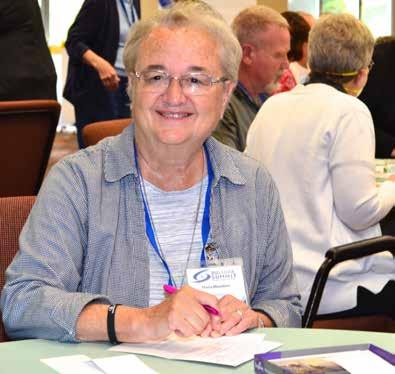
9 minute read
For Women of Faith, Catholic Social Teaching Takes Center Stage

Catholic Social Teaching (CST) is often called the best kept secret of the Catholic Church. It is not a new concept, nor is it a political concept. It is based in Scripture from Old Testament to New Testament.
Catholic Social Teaching is a central and essential element of Catholic faith, that is rooted in the Hebrew prophets who announce God’s love for the poor and call God’s people to a covenant of love and justice (From Sharing Catholic Social Thought: Challenges and Directions, USCCB).
Because the key principles of human dignity, solidarity and subsidiarity are at the core of the Catholic faith, CST is about principles not positions. These three principles, along with Scripture and tradition, provide the underlying foundation needed to address current social issues.
Pope Francis reminds us in Evangelii Gaudium that “An authentic faith – which is never comfortable or completely personal – always involves a deep desire to change the world, to transmit values, to leave this earth somehow better than we found it.”
Sister Kathleen Ryan, along with Co-Directors Ann Clark and Katie Drager, leads numerous JPIC (Justice, Peace and Integrity of Creation) initiatives for SND USA centered around advocacy and service. Together, these dynamic women are working to encourage others to incorporate CST doctrine into their own lives and demonstrate how to get involved in local avenues for service.
Clark says, “Catholic Social Teaching is a body of work and a call to action based on gospel values, the example of Jesus Christ, and a long history in the Catholic Church. At its foundation is the belief that ALL people are made in the image of God and, therefore, have rights and responsibilities to care for each other and our world. We especially focus on those pushed to the margins of society, often the most vulnerable in our communities.”
At its foundation is the belief that ALL people are made in the image of God and, therefore, have rights and responsibilities to care for each other and our world. We especially focus on those pushed to the margins of society, often the most vulnerable in our communities.
– Ann Clark, Co-Director of the SND National Justice, Peace and Integrity of Creation Office
She continues, “CST is a good model of how to respond to the many crises and difficulties that plague our world. CST’s model is that, as a community, we need to see what is happening right now (read the signs of the times), assess the problems and challenges, discern what we can do to bring justice to the situations, and then act on our convictions. This process is done with others, and is a process; so we are always reevaluating, assessing and adapting actions that are in line with church teaching to respond to those in need.”
As a woman of faith, Clark says she feels personally compelled to be involved in Catholic Social Teaching work. “I have found working within the Catholic Church, and specifically with women religious, is a sound, effective and impactful way to respond to the times. From an early age, I have seen injustices and felt called to do something. Working in the JPIC office for the Sisters of Notre Dame allows me to work with other men and women who also want to respond, and it gives me a clear foundation on which to build on their longtime commitment to working for justice and peace.”
CST is woven into the ministries of the Sisters of Notre Dame, beginning with education, outreach, direct service, building and infrastructure development and even board service. There are many ways to make an impact.
According to Sister Rita Mary Harwood, “The main focus of Catholic Social Teaching is rooted in the dignity of every single person.” Sister Rita Mary struggled with the sadness of losing her brother who was murdered as a young man. “It took me four to five years being involved in prison ministry to realize I was healed. Having the opportunity to get to know men and women who were incarcerated – to talk to them, hear what motivated them, hear their hopes and dreams for the future and their struggles – connected me to their humanity and their goodness.”
Nothing is more practical than finding God, than falling in Love in a quite absolute, final way. What you are in love with, what seizes your imagination, will affect everything. It will decide what will get you out of bed in the morning, what you do with your evenings, how you spend your weekends, what you read, whom you know, what breaks your heart, and what amazes you with joy and gratitude. Fall in Love, stay in love, and it will decide everything.
- Father Joseph Whelan, SJ

This experience, along with Catholic Social Teaching principles, taught her that all persons have worthy contributions to make. Sister Rita Mary shared how incarcerated people in Northeast Ohio made more than 49,000 masks during the COVID pandemic. “These masks were beautiful and were used by Catholic Charities and children in our schools.”
Sister Constance Marie Suchala, a court-appointed special advocate for children in Lucas County, OH, believes that “Catholic Social Teaching is finding what is needed by the young person and helping them find it in themselves.”
Sister Judeen Julier, a sister for more than 50 years, has worked for the past 17 years as a hospital chaplain, one mile from skid row in downtown Los Angeles, California. “Being a chaplain is being a story catcher. We listen and meet people where they are.”
Sister Marla Monahan explains, “We can help our students and employees recognize they are loved by God just the way they are. Anthony DeMello, (1931-1987), an Indian Jesuit priest, psychotherapist and spiritual teacher, said, ‘You don’t have to change for God to love you.’ This quote had a profound impact on me. Like many of us, I think we sometimes have thoughts that we aren’t good enough, that we aren’t worthy of being loved, etc. I want to know God, the true and living God, not a God I make up. Scriptures remind us, ‘God is love.’”
Sister Marla says the first principle of CST is about “the life and dignity of the human person. I think treating others with respect, love and forgiveness models God’s love. There is a story about Mother Teresa of Calcutta. She took a dying man into her home, and each day she bathed him, and he would spit in her face. On the day he died, she had again bathed him. Instead of spitting in her face, he spoke to her for the first time: ‘Mother Teresa, does your God love like you?’ Her unconditional love for him let him experience God’s love.”
As a formation director, Sister Marla engaged a theologian to teach the novices about Catholic Social Teaching. “I remember Dr. Robert J. Miller saying that there are two privileged ways of knowing Jesus: in the Eucharist and in the poor. He commented that every Church has its tabernacle, but does every Church have a soup kitchen? I am reminded that the service of love is not an option. It is the Gospel. I am involved in Catholic Social Teaching because I think it is the heart of the Gospel. For me, living CST is living the Gospel. It shows up in my relationships and in my ministry.”
Sister Marla attended an archery tournament at Notre Dame Academy in Covington, KY because her nieces were involved. “They told me they had eaten at Skyline Chili and noticed an older gentleman eating alone. They paid for his food. He cried when he found out. I told them I noticed the Notre Dame Academy electronic signage in front of their school read, ‘Love God. Love Your Neighbor. Change the World.’ I reminded them they had done that. Each person has unique gifts to share with the world, to help make it the world God desires. I think women and men can exhibit CST values by how they live their life. I love the words attributed to St. Francis: ‘Preach the Gospel and use words if you must.’”

We can help our students and employees recognize they are loved by God just the way they are.
– Sister Marla Monahan
CST provides the framework to reorient one’s viewpoint from self to how we engage and respond to others. This can happen in many big and small ways every day. For example, practicing Catholic Social Teaching came down to “calling students at 6:00 a.m. who were chronically late to school to show I cared,” describes Sister Nicole Varnerin. While for Sister Joyce Bates it was housing 37 volunteers from different states who came in order to serve at the migrant shelter in Laredo, Texas.
Any time you plan an activity where young people are involved in reaching out to their neighbor – whether that be a food collection, a hunger center visit, bringing clothes to those most in need – you are showing them that common good is part of their responsibility,” Sister Kathleen Ryan passionately explains. “Saint Paul encouraged others to ‘Live a life worthy of your calling.’
Clark says, “It is up to each person to look at the situations within their circles of influence to determine where the need is greatest. It can be in a family, in a small town or in a large city. It can also extend beyond our borders. Each person has the responsibility to see what is happening around them, give deep thought and reflection (discernment) about what they are called to do, and then decide how they will act.” To learn of opportunities with the SND Justice Peace, Integrity of Creation Office, please call (440) 279-1182.






